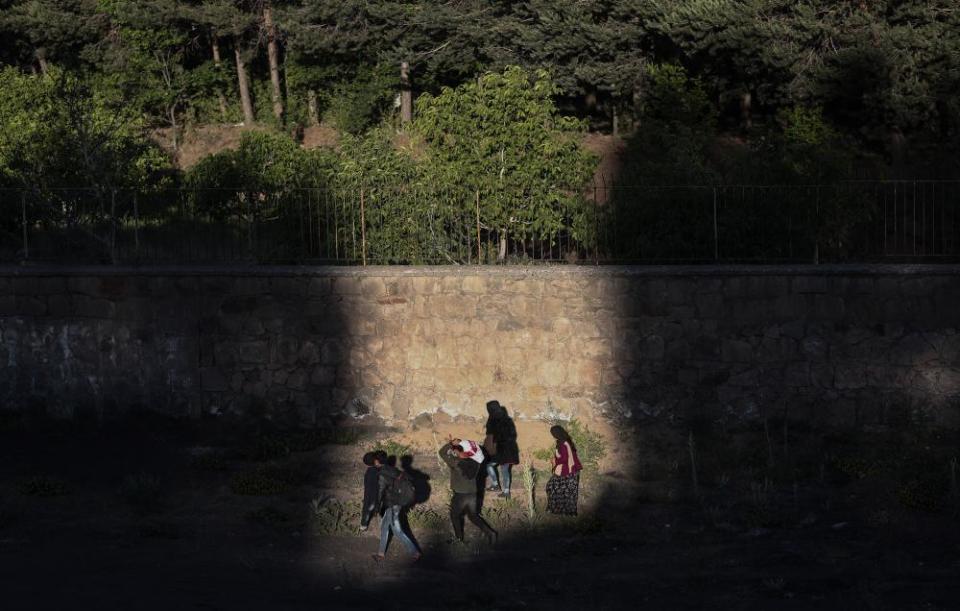‘We walked 18 hours, no food’: Taliban advance triggers exodus of Afghans
A weary Zebah Gul and her eight children are gathered quietly in a small room at a transit centre in Herat, north-eastern Afghanistan. Their six-month attempt to escape the war and find safety has failed.
They have just spent a week in Iranian police detention after being caught trying to cross the border into Turkey, and are beginning to make their way back to their besieged home province of Takhar, on the opposite side of the sprawling country.
“Our village was surrounded by Taliban and government forces. Airstrikes and firefighting between both sides were a daily occurrence,” says Gul, 35, whose husband is still in Iran after evading arrest.
Her husband had worked as a farmer until it became too dangerous. Their plan had been to stay only a short time in Iran because the pandemic and US sanctions have made it tough to find work there, and life is more expensive. The family’s priority was their children’s safety; they were so desperate to leave they didn’t even know which Turkish city they’d arrive in.
“Afghanistan is not a good place to be – there is war and the security situation is not good,” says Gul.
The family agreed to pay a smuggler $650 (£471) for each person if the crossing was successful, but their attempt was thwarted by Iranian border police. Everyone apart from Gul’s husband was arrested.
“We are devastated to have to return to Takhar. It is not safe,” says Gul.
Owning no property and with few work prospects, and facing daily conflict, the family have little to go back for, apart from a few relatives. Their story is not unique; as Taliban fighters have swept across the country in recent weeks, civilians have been caught in the crossfire. On 21 July, the Pentagon admitted that half of all district centres are now in the hands of the Taliban, which surround 17 of Afghanistan’s 34 provincial capitals.
Afghanistan is battling additional crises, including severe drought, the impact of Covid and diminishing aid funding – the UK has slashed its direct aid to Afghanistan by 78%, amid international military withdrawals and the huge territorial gains for the Taliban.
Less than a quarter of the the $1.3bn (£290m) in global aid the UN says is needed this year has been delivered in Afghanistan, leaving humanitarian organisations unable to deliver on-the-ground assistance.
Cross-border returns have increased since the start of the pandemic in early 2020. Approximately 550,000 people have returned to Afghanistan so far this year, says Nick Bishop, emergency response officer for the International Organization for Migration (IOM). That’s double the usual rate, he says, and 55% of those people arrived after being deported back to the country.
There are new powers in many areas … people are concerned about what will happen to education and the future for women
Nick Bishop, IOM
“Normally we see 500,000 [people] a year; there are quite a lot of circular migration flows, which are linked to the agricultural seasonal migration, so it’s not unusual to see that number. But in the last five years particularly, the socioeconomic conditions have really deteriorated – 90% of Afghans live on £1.50 a day,” says Bishop.
“As the conflict intensifies, more people will be driven into displacement. There are new powers in different parts of the country, and a lot of people are concerned about what comes next in terms of education and the future for women.”
Smuggling networks across Afghanistan take people across the border, and entering Turkey through Iran is a common route.
Hafizullah and Shaiesta, and their two young children, left their home in Takhar two months before arriving at the transit centre. It was a perilous journey to Tehran, from where they had planned to travel to Turkey and eventually to Europe, but Hafizullah was arrested by Iranian police before the family had a chance to make the crossing.
Related: 'Shot at by both sides': Families flee as Taliban battles for territory in Kandahar
“I had no job in Takhar and there was so much fighting … there were suicide attacks, the security situation in Afghanistan is bad,” says Hafizullah, who did not give his second name. “We walked for 18 hours with no food at one point to make it to Iran. The children were crying, my wife and I were both terrified we’d be shot by police.”
In Tehran, Hafizullah says he worked illegally as an assistant in a shop for 200 Afghanis (£1.83) a day, until he believes he was reported to the authorities.
Since the start of the year, the fighting has driven nearly 223,000 people from their homes, according to the UN. Turkish media has reported that between 500 and 1,000 Afghans are crossing the border into Turkey illegally every day.
“The Turkish-Iranian frontier is heavily fenced. The fact is that, for Afghans to cross, there will be family separation, and attempts to cross Lake Van. There will be a lot of Afghan deaths,” says Bishop, who says 8,400 Afghans have been sent back on deportation flights from Turkey this year.

He says opportunistic criminals are targeting Afghans in Iran.
“We have a number of Afghans held in captivity for extortion. A family of 17 had sold all of their possessions, moved to Iran with the intended destination of Turkey and then were extorted for $20,000. They had to raise that money – an extortionate amount of money – then they were handed over to the Iranian authorities,” says Bishop.
“People are attempting to find new solutions for themselves. Afghans would like to stay at home, they are very nationalistic. It is a symptom of a broader economic security dynamic across the country.”

 Yahoo News
Yahoo News 
